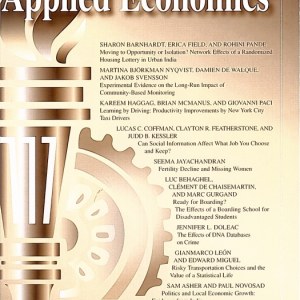
Barr, A., Dekker, M., Janssens, W., Kebede, B. and Kramer, B. (2019). Cooperation in polygynous households American Economic Journal: Applied Economics, 11(2):266--283.
-
Affiliated authorsWendy Janssens, Berber Kramer
-
Publication year2019
-
JournalAmerican Economic Journal: Applied Economics
Using a carefully designed series of public goods games, we compare, across monogamous and polygynous households, the willingness of husbands and wives to cooperate to maximize household gains. Compared to monogamous husbands and wives, polygynous husbands and wives are less cooperative, one with another, and co-wives are least cooperative, one with another. The husbands' and wives' behavior in a corresponding series of inter-household games indicates that these differences cannot be attributed to selection of less cooperative people into polygyny. Finally, behavior in polygynous households is more reciprocal and less apparently altruistic.